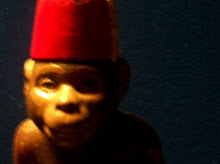I finished Michel Houellebecq’s
The Elementary Particles. Whew. I figured there was a good chance that I was going to hate it. I’d read reviews of it a while back that made me think it was not for me. Houellebecq has been described as humorless, self-important, misogynistic, misanthropic…the whole shebang. Then I read
this, which made me think twice and actually check it out for myself. I’m glad I did. Make no mistake, it’s a damn bleak book (“darker even than Beckett”):
Humor won’t save you; it doesn’t really do anything at all. You can look at life ironically for years, maybe decades; there are people who seem to go through most of their lives seeing the funny side, but in the end, life always breaks your heart. Doesn’t matter how brave you are, or how reserved, or how much you’ve developed a sense of humor, you still end up with your heart broken. That’s when you stop laughing. In the end there’s just the cold, the silence and the loneliness. In the end there’s only death.
But there’s something…palpable, sorrow perhaps, below the surface, that kept me giving Houellebecq the benefit of the doubt as it implied, for me anyway, an author with a heart capable of moral despair and perhaps even love.
What the boy had felt was something pure, something gentle, something that predates sex or sensual fulfillment. It was the simple desire to reach out and touch a loving body, to be held in loving arms. Tenderness is a deeper instinct than seduction, which is why it is so difficult to give up hope.
Oh, it’s a pretty good read too—it imagines the genesis of a possible future through the story of two brothers. Houellebecq depicts our time as rushing toward dissolution and entropy, but he implies a future that resists being labeled either utopian or dystopian, though I suspect others might disagree, strongly, given the way the book ends: the imminent extinction of the human race. The future itself is only hinted at:
We live today under a new world order,
The web which weaves together all things envelops our bodies,
Bathes our limbs,
In a halo of joy.
A state to which men of old sometimes acceded through music.
Yes music can bring joy to life. It's small acknowledgements like that that preserve the book's humanity. Though Tricky must admit that he himself felt skewered, and rightfully so perhaps, by one passage in particular.
“I’m useless,” he said resignedly. “I couldn’t breed pigs, I don’t have the faintest idea how to make sausages or forks or mobile phones. I’m surrounded by all this stuff that I eat or use and I couldn’t actually make a single thing—couldn’t even begin to understand how they’re made. If industrial production ceased tomorrow, if all the engineers and the specialist technicians disappeared off the face of the earth, I couldn’t do anything to start things over again. In fact, outside the industrialized world, I couldn’t even survive; I wouldn’t know how to feed or clothe myself, or protect myself from the weather. My technical competence falls far short of Neanderthal man. I’m completely dependent on my society, but I play no useful role in it. The only thing I know how to do is write dubious commentaries on outdated cultural issues.
Ouch. I'll share some more pithy Houellebecq wisdom in the next couple days. Right now there are some other controversial novels of the nineties I need to tend to, and some nineteenth century history I've been meaning to comment on. Ouch.


